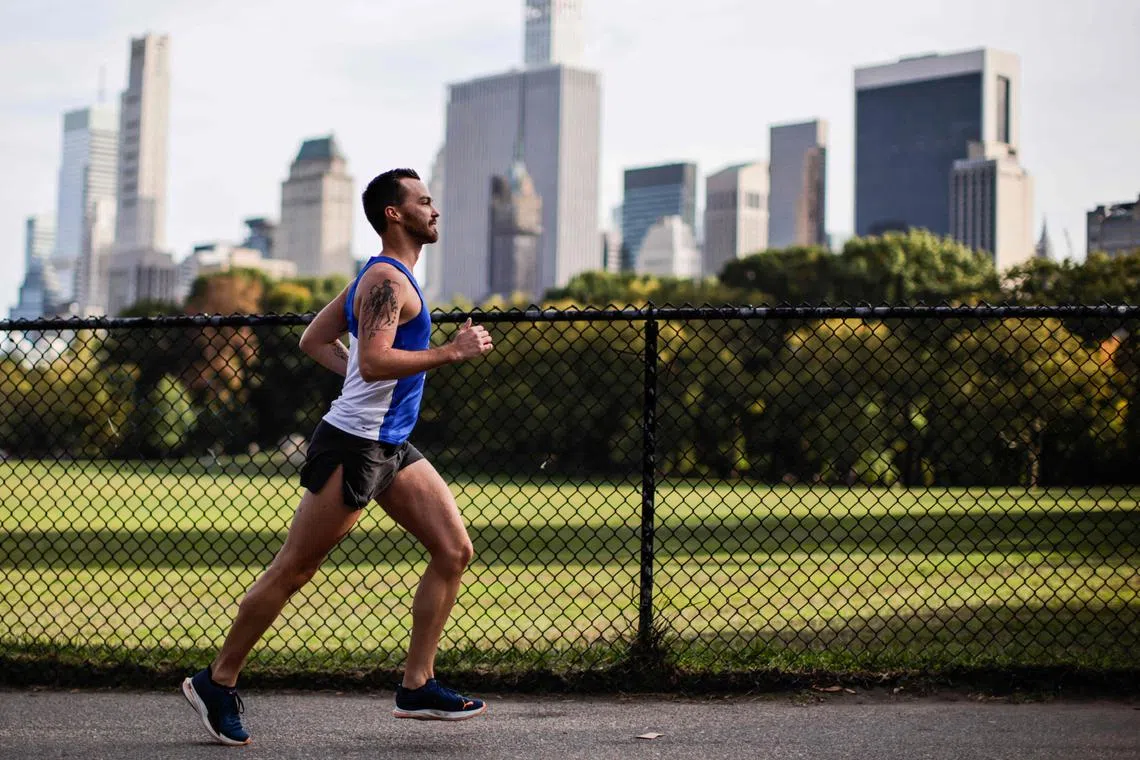Athletics: Non-binary category allows marathon runners to compete 'as authentic self'
Sign up now: Get the biggest sports news in your inbox

Nick Dill runs in Central Park on Oct 12 in preparation for the New York City Marathon.
PHOTO: AFP
NEW YORK – Nick Dill is a veteran marathon runner, but Sunday’s race in New York will be the first time they participate in the non-binary category, after contest organisers added the option in response to demands for better representation and inclusion.
A professional dancer who now works as an acupuncturist, Dill has already run the distance in less than three hours, previously racing in the men’s category.
“I was born a male, I identified as a male for many years,” the 28-year-old said.
But since coming out as non-binary in January, Dill said they felt “discomfort” and “confusion” over having to decide between the races for men and women.
“I’m kind of both and kind of neither... it feels really comforting to be able to race in the category that I identify with.”
Growing up as a dancer and gymnast, Dill did not take up running until adulthood.
“I was nervous to get into racing because of this kind of toxic masculine energy,” they said. “Kind of still having those fears of like, not fitting in.”
A 2021 study from the Williams Institute at the University of California, Los Angeles found that approximately 1.2 million people identify as non-binary across the United States.
According to a list maintained by activist Jake Fedorowski, more than 200 road or trail racing events in the US now offer three gender categories.
“For somebody who doesn’t identify as either male or female, having to register with no other options already kind of creates either a mental barrier or just another obstacle for them being able to fully participate,” said Kerin Hempel, CEO of the New York Road Runners organisation behind the city’s famed marathon, which was the first event of its kind to expand the categories.
In 2021 the New York marathon included 16 non-binary runners. In 2022 it counts more than 60. Several other major races, including Boston and London, have since taken similar steps to expand options.
Jake Caswell, a 25-year-old clinical analyst who was a top athlete for Columbia University, said crossing the finish line earlier in 2022 for the first time as a non-binary runner was “freeing”.
“I think it’s just being able to run as your authentic self,” they said, to “create a space for, you know, a group of people that that space was never there before”.
In 2022, the New York marathon has financially endowed its newest category, with a US$5,000 (S$7,000) prize for the first-place runner.
Nancy Hogshead-Makar of the organisation ChampionWomen, sees this new category as “one step” towards inclusion, that could extend to “more categories” including one for transgender athletes.
She, along with other activists, favours limiting the women’s category to transgender athletes who “have taken steps to roll back their male puberty advantage with hormones and/or surgery” – a stance widely criticised within the LGBTQ community.
It is a topic that has provoked significant controversy in the US. Debate roiled after the transgender swimmer Lia Thomas won a university title in March, and the International Swimming Federation banned from women’s categories all athletes who have transitioned after the age of 12.
And a number of states controversially have adopted legislation forbidding transgender athletes from participating in youth sports.
But so far, creating non-binary categories generally has provoked positive reaction. But there are still criticism, and Dill said much of it has been online.
“I think it’s just a lack of education... as people learn more and except more, and as there’s more visibility, I think it’ll be more accepted,” they said.
For Dill, the marathon on Sunday will be “a celebration”, citing “a sense of community”.
“We all kind of are really taking part in this like, uplifting of each other.” AFP


